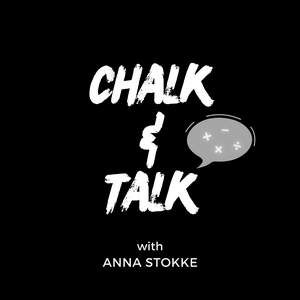In this episode, Anna is joined by Dr. Jared Cooney Horvath, a cognitive neuroscientist, educator, and bestselling author of The Digital Delusion. They examine what decades of research and international data reveal about classroom technology, screens, multitasking, attention, and memory, and why more technology often leads to less learning.
Jared explains how offloading knowledge to devices can undermine higher-order thinking, why human teachers’ expertise, and practice, remain central to learning, and when technology may help or hinder students. The conversation also tackles how schools and families can navigate an increasingly tech-saturated education system.
This is a thoughtful, evidence-informed episode for educators, parents, and anyone questioning whether digital tools in the classroom are helping students learn or holding them back.
This episode is also available in video at www.youtube.com/@chalktalk-stokke
Order The Digital Delusion here: https://www.lmeglobal.net/digital-delusion
TIMESTAMPS
[00:00:22] Introduction
[00:04:50] Cognitive decline among Gen Z
[00:09:14] The decline international test scores and the correlation with technology
[00:11:28] Screen usage in schools
[00:13:03] Relationship between EdTech and countries that invest less in it
[00:16:16] Effect size in education in the context of EdTech
[00:20:49] What forms of EdTech work?
[00:25:17] When EdTech is a better than nothing
[00:32:57] Practise and producers are essential to learning
[00:33:30] What is creativity?
[00:34:20] Why offloading learning to technology harms creativity
[00:38:50] AI: The Tool Nobody Asked For
[00:44:17] Difference between K-12 and university students using EdTech
[00:47:14] EdTech creates multi-tasking
[00:54:27] Advice: Responding to “digital devices are ubiquitous”
[00:55:50] Advice: Responding to “these students learn differently”
[01:00:32] General advice for parents and school leaders
[01:03:46] Laptops vs iPads vs notetaking by hand
[01:06:48] Being a Luddite in the 21st century
RELEVANT PREVIOUS EPISODES
Educational leadership: Improving math and literacy with Scott Hill
https://www.podbean.com/ew/pb-vpzf8-16d0c17
Mindsets and educational misconceptions with Carl Hendrick
https://www.podbean.com/ew/pb-78zv9-15493b1
Applying cognitive science to education with Daniel Willingham
https://www.podbean.com/ew/pb-szugf-149dff1
The tweet that roared with Tom Bennett
https://www.podbean.com/ew/pb-bpgqn-14326ef
EPISODE TRANSCRIPT
https://www.annastokke.com/transcripts/ep-62-transcript
MUSIC
Intro & Outro: Funk Jazz Big Band - ColorFilmMusic
Website: www.annastokke.com
FB: Chalk & Talk
IG: @chalkandtalkpodcast
Tiktok: @chalkandtalkpodcast
X: @rastokke
LinkedIn: www.linkedin.com/in/anna-stokke-3a1b4c
Bluesky: @rastokke.bsky.social


